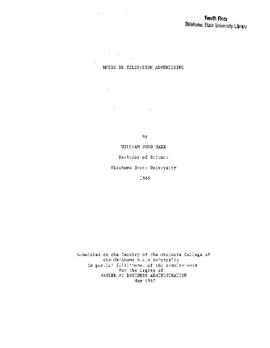| dc.contributor.advisor | Weeks, Richard R. | |
| dc.contributor.author | Marx, William John | |
| dc.date.accessioned | 2016-01-27T22:26:46Z | |
| dc.date.available | 2016-01-27T22:26:46Z | |
| dc.date.issued | 1967-05 | |
| dc.identifier.uri | https://hdl.handle.net/11244/26927 | |
| dc.description.abstract | Scope and Method of Study: A catalog of information offering the advertising executive, marketing executive, and music supplier creative, psychological, and-practical insight as to the past, present, and future status of music in television advertising, and to its value and/or nonvalue in commercial productions. A survey of the literature, inventory of psychological findings, and a mail questionnaire survey of executives; involved with commercial music offers a comprehensive view of the business of television advertising music. | |
| dc.description.abstract | Findings and Conclusions: The major trend in contemporary advertising is creative marketing. Caught up in this trend is an increasing sophistication in the use of music in television advertising. The strengths or weaknesses of music in commercial productions depend almost entirely upon those people responsible for its creation and use. The typical person responsible for television-commercial music at the advertising agency level is the production executive. Although some larger agencies employ music directors, they are few and far between. Advertising agency music executives prefer the use of original as opposed to well-known, familiar music. They tend to have a disregard for the use of research to test the effectiveness of musical treatments, although the rising cost of musical talent may soon justify such research. The old stereotype envisioning the use of music solely for memory value is becoming a false generalization as today's advertising executive sees much more psychologically sophisticated uses for commercial music. He believes that music is successful in accomplishing the technical objectives and goals of its use. The advertising agency executive perceives dangers in the use of music that technically interferes with a commercial, is inappropriately conceived for a particular audience, or if it is used unnecessarily. The major problems encountered by agency music executives involve financial considerations, and human relations, respectively. Since most advertising agencies will not incorporate a music department in the foreseeable future, the role of the commercial music specialist will take on greater importance. | |
| dc.description.abstract | The music specialist differs from the advertising agency music man in four respects--a more total involvement with musical aspects (obviously), a tendency to overestimate the selling power of music, differing organizational objectives in the use of music, and a difference in the perceived day-to-day problems of the business. In spite of these differences, the specialist and agency executive are fairly consistent in their feelings toward a preference for original music, a disregard for research on the effects of music, the degree to which music accomplishes its intended objectives, and the perceived dangers of using music in television advertising. | |
| dc.format | application/pdf | |
| dc.language | en_US | |
| dc.rights | Copyright is held by the author who has granted the Oklahoma State University Library the non-exclusive right to share this material in its institutional repository. Contact Digital Library Services at lib-dls@okstate.edu or 405-744-9161 for the permission policy on the use, reproduction or distribution of this material. | |
| dc.title | Music in television advertising | |
| osu.filename | Thesis-1967R-M392m.pdf | |
| osu.accesstype | Open Access | |
| dc.type.genre | Master's Report | |
| dc.type.material | Text | |
| thesis.degree.discipline | Marketing | |
| thesis.degree.grantor | Oklahoma State University | |
